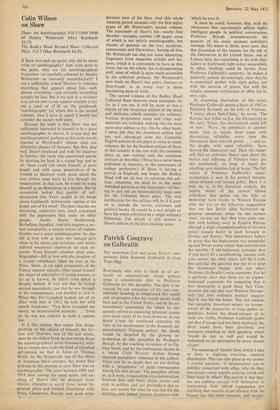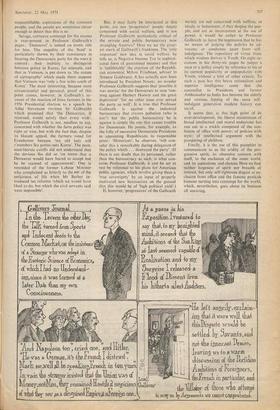Patrick Cosgrave on Galbraith
Everybody who tries to think at all ser- iously or constructively about politics owes a considerable debt to Professor Galbraith for this pamphlet. The debt is in- creased by our awareness of his very con- siderable standing in enlightened (his word) and progressive (also his word) circles both here and in the United States, and by his ex- traordinary consistency (to which he fre- quently refers) in espousing reformist causes over many years. If we were, however, in any doubt a'mut his continued centrality (in view of his involvement in the Kennedy ad- ministration's Vietnam policy), the doubt would be dispelled by the glowing in- troduction to this pamphlet by Professor Balogh, by the touching reverence of its Fa- bian blurb, and by the enthusiasm shown in a recent Child Poverty Action Group research pamphlet's reference to the author. There can be no doubt that we are dealing with a 'progressive' of great consequence among his own people. The pamphlet allows us, as it were, to eavesdrop on a conversation between him and them about means and ends in politics; and our gratitude is due to him, not merely for what he says but for the startling, and, indeed, blatant, frankness with which he says it.
It must be noted, however, that, with the obtuseness that occasionally afflicts highly intelligent people in political conversation, Professor Balogh misunderstands the purport of his more eminent confrd.e's message. He seems to think, poor man, that this discussion of the reasons for the fall of the Democrats in the United States, and of Labour here, has something to do with their failure to implement right policy successfully in office. Nothing could be further from Professor Galbraith's concerns: he makes it perfectly, indeed, devastatingly, clear that he is concerned neither with right policy nor with the exercise of power, but with the simple, sensuous satisfaction of office for its own sake.
In disarming illustration of this point, Professor Galbraith quotes a letter of 1962 to President Kennedy on the folly of Vietnam. 'I worry about Indo-China,' he wrote. 'The Korean war killed us [i.e. the Democrats] in the early 'fifties; this involvement could kill us now."Wars', hp complains at another point, 'just or unjust, have come with devastating reliability every time the Democrats have enjoyed power . . and so, the people. with equal reliability, 'have thrown the Democrats out'. Here the reader will find no orthodox liberal cant about the horror and suffering of Vietnam (they are not mentioned), no tinge of regret for anything save elections lost at home. The full extent of Professor Galbraith's single- mindedness is seen in his general remarks about defence and foreign policy. Here, it is true, he is, in his historical analysis, the supine victim of the current liberal orthodoxy that points out the folly of deploying NATO troops in Western Europe after the war on the fallacious supposition that our late Soviet allies harboured ag- gressive intentions when 'in the mature view', we can see that they were quite con- tent with holding sway in Eastern Europe (though a slight misunderstanding of his own policy caused Stalin to push forward in Greece and Korea). This elementary failure to grasp that the deployment was essentially against Soviet power rather than doctrine (on the sensible, if old-fashioned, principle that if you don't fill a neighbouring vacuum with your power, the other fellow will fill it with his) and that the doctrine was put in to keep the Americans happy, does not affect Professor Galbraith's main argument. For he is perfectly clear that there are no copper- bottomed arguments for supposing that it was necessarily a good thing that Com- munism did not take over Western Europe : only 'my own orthodox instinct' suggests that it was for the better. The real mistake was spending American money on troops: aware of the popularity of large public ex- penditure before the disadvantages of its scale are visible, Professor Galbraith points out that if troops had not been deployed, the draft could have been abolished, and resources switched to civil spending which 'would do just as well and would be welcomed as an alternative by every decent citizen'.
The meaning of 'decent' here, which I take to have a slighting overtone, requires elucidation. This can take place as we answer a crucial question : if 'progressives' are so selfishly concerned with office, why do they not always adopt popular policies which will keep them in office? The answer is that they arc not ruthless enough with themselves in overcoming their inbred repugnance for anything that smacks of an alliance with, or respect for, the often complex, and usually
unquantifiable, aspirations of the common people; and the people are sometimes clever enough to detect that this is so.
Savage, corrosive contempt for the masses is ever-present in Professor Galbraith's pages: 'Democrat' is indeed an ironic title for him. The stupidity of the 'herd' is particularly shown by their consistency in blaming the Democratic party for the wars it entered : their inability to distinguish between policy in Korea, for example, and that in Vietnam, is put down to 'the nature of cartography' which made them suppose that Vietnam was 'only a few miles south of Korea'. The most interesting, because most circumstantial and personal, proof of this point comes, however, in Galbraith's ac- count of the reaction of Iowa farmers in the 1956 Presidential election to a speech by Adlai Stevenson (written by Galbraith) which promised that 'the Democrats, if returned, would satisfy their every wish'. Professor Galbraith is not, needless to say, concerned with whether the farm policy was right or wise, but with the fact that, despite its blatant appeal, the farmers voted for Eisenhower because 'my old lady still r'members Ike gottus outa Korea'. The poor, semi-literate caitiffs did not understand that the devious Ike did so 'on terms that a Democrat would have feared to accept lest he be accused of appeasement'. One is reminded of the former Labour Minister who complained so bitterly to the Bac of the unfairness of life when Mr Barber in- troduced tax reforms 'which we would have liked to do, but which the civil servants said were impossible'. But, it may fairly be interjected at this point, are not 'progressive' people deeply concerned with social welfare, and is not Professor Galbraith particularly critical of the private and public bureaucracy now strangling America'? Here we see the great- est merit of Galbraith's frankness. The 'only important' new idea in social welfare. he tells us, is Negative Income Tax (a sophisti- cated form of guaranteed income) and that is 'indubitably' the creation of the Republi- can economist Milton Friedman, adviser to Senator Goldwater. It has actually now been introduced by President Nixon: no wonder Professor Galbraith suggests that 'possibly it was unwise' for the Democrats to stop 'run- ning against Herbert Hoover and the great depression' for no other issue ever served the party so well'. It is true that Professor Galbraith is against the industrial bureaucracy that creates pollution (who is not?) but the public bureaucracy he is against is simply the one that causes trouble for Democrats. He points, for example, to the folly of successive Democratic Presidents in appointing Republicans to responsible posts: 'Historians', he observes, 'will con- sider this a remarkably daring delegation of the policy which ... destroyed the party'. (If there is any doubt that its personnel, rather than the bureaucracy as such, is what con- cerns Professor Galbraith, it can be set at rest by reference to his plans for American public agencies, which involve giving them a 'true sovereignty' by an input of properly motivated new bureaucrats on the ground that this would be of 'high political yield'.) If, however, 'progressives' of the Galbraith variety are not concerned with welfare, or ideals, or betterment, if they despise the peo- ple, and are so incompetent at the use of power, it would be unfair to Professor Galbraith to leave the impression that he has no means of judging the policies he ad- vocates or condemns apart from self- indulgence. The repository of virtue from which wisdom derives is Youth. On eight Oc- casions in his thirty-six pages he judges a man or a policy simply by reference to his or its current popularity or unpopularity with Youth, without a hint of other criteria. To such a pass has this brave rationalism and superior intelligence come that the counsellor to Presidents and former Ambassador to India has become the elderly and anxious lapdog of the most self- indulgent generation modern history can recall.
It seems that, at this high point of its over-development, the liberal mainstream of broad intellectual and moral endeavour has run out in a trickle composed of the con- fusion of office with power; of policies with style; of intellectual argument with the pampering of children.
Finally, it is the use of this pamphlet to communicate to us the aridity of the pro- gressive spirit, its obsessive concern with itself, to the exclusion of the outer world, and its aspirations and choices. Here we find neither largeness of spirit nor breadth of interest, but only self-righteous disgust at ex- clusion from office and the famous pawkish humour turning into contempt for the world, • which, nevertheless, goes about its business all uncaring.



































 Previous page
Previous page